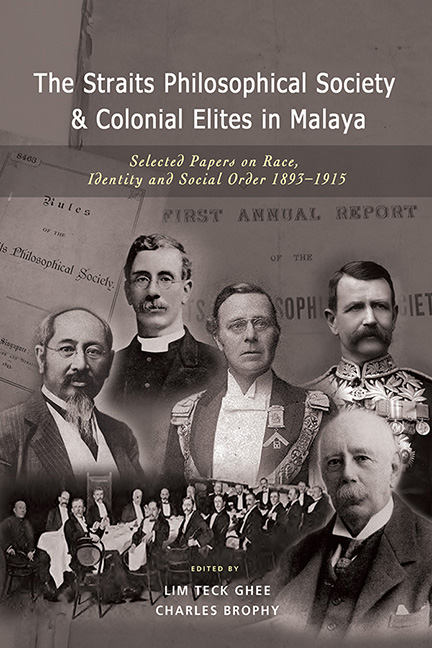 The Straits Philosophical Society and Colonial Elites in Malaya
The Straits Philosophical Society and Colonial Elites in Malaya Published online by Cambridge University Press: 09 January 2024
Editors’ Note
The search for the “Real Malay” long engaged European visitors and officials in the Peninsula and wider region. Among the Society’s members, these discussions gave particular focus to anthropological concerns around the culture and mindset of the Malays, which centred on a series of deficiencies related to factors of environment, culture and genetics perceived by European thought to be found in the community. One such study is found in the account of latah, a nervous disorder, presented to the Society by D.J. Galloway in 1897 and responded to by H.N. Ridley. Galloway was a doctor and founder of the Straits Medical Association. In his 1897 paper he was concerned not only with latah as a medical condition, but also with latah’s connection to the prevailing ideas of race and the culture of the Malays. Galloway argued that the Malays possessed attributes that were “chiefly mental” which isolated them from the other races of the Peninsula. The Malay, he noted, whilst hiding under a “mask of impassivity, of stoical deference”, possessed a “sentient personality” and a “high degree of responsiveness to impulses outside him”. Latah was thus seen to result from an increased susceptibility to external stimuli and from a lack of ability to repress instincts. The cause of this condition, he suggested, was the lack of education, which prevented subjects “from arranging and inhibiting [their] ideas”. Ridley, in his criticism, noted that the spread of education and “contact with a higher civilization” was making latah difficult to find in the towns. This suggested to him that with modernization under British rule, latah would gradually die out. At the same time he conceded: “[A]t present our knowledge of psychics is really small, and of its relationship to the structure of the nervous system we know almost nothing”.
To save this book to your Kindle, first ensure [email protected] is added to your Approved Personal Document E-mail List under your Personal Document Settings on the Manage Your Content and Devices page of your Amazon account. Then enter the ‘name’ part of your Kindle email address below. Find out more about saving to your Kindle.
Note you can select to save to either the @free.kindle.com or @kindle.com variations. ‘@free.kindle.com’ emails are free but can only be saved to your device when it is connected to wi-fi. ‘@kindle.com’ emails can be delivered even when you are not connected to wi-fi, but note that service fees apply.
Find out more about the Kindle Personal Document Service.
To save content items to your account, please confirm that you agree to abide by our usage policies. If this is the first time you use this feature, you will be asked to authorise Cambridge Core to connect with your account. Find out more about saving content to Dropbox.
To save content items to your account, please confirm that you agree to abide by our usage policies. If this is the first time you use this feature, you will be asked to authorise Cambridge Core to connect with your account. Find out more about saving content to Google Drive.